|
|
|
Sort Order |
|
|
|
Items / Page
|
|
|
|
|
|
|
| Srl | Item |
| 1 |
ID:
114869


|
|
|
|
|
| Publication |
2012.
|
| Summary/Abstract |
In recent years there has been much debate about whether the activities of missionaries were an act of religious altruism or a medium of cultural expansion and a preparation for political involvement. The American expedition occurred during the early years of modern Western - as yet mainly British, French and Russian - penetration of the Ottoman realms. The immediate effect was to draw the East into the rapidly expanding capitalist world economy while containing the ambitions of rival powers in order to prepare for the Sublime Porte's ultimate dismemberment. This phase of missionary activity represented something extraordinary, because the Americans were attempting to impose their kind of Christianity, namely, Protestantism, on communities which had been Christian well before the Christian American identity came into being. This article examines the formation of the American Protestant missionaries' activities in Anatolia; missionaries' evaluations of events within the Empire, and their relations with the Armenians will be the focus of the analysis. In other words, attention will be drawn to how the missionary enterprise fostered Armenian nationalism by introducing Western political ideals and promoting Armenian cultural identity through education and the press discussed. Rather than examining the Armenian Question, this paper will trace the genesis of Armenian nationalism through the Boards' Protestant Anatolia vision.
|
|
|
|
|
|
|
|
|
|
|
|
|
|
|
|
| 2 |
ID:
119724
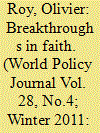

|
|
|
|
|
| Publication |
2011.
|
| Summary/Abstract |
Florence-Faith made a sudden breakthrough into contemporary global politics with the 1979 Islamic Revolution in Iran. From the Taliban to al-Qaida, the following three decades have been full of international tensions where faith was a leading factor, but this unease has by no means been restricted to the Muslim world. The Catholic Church found a new visibility under the leadership of John Paul II, shaking the communist grasp on Eastern Europe. Millions of converts from Catholicism to Protestantism are reshaping domestic politics in Brazil and other Latin America countries. Conversions from Islam to Christianity have created diplomatic hurdles in Malaysia and Afghanistan, while foreign missionary activities came under state scrutiny in India, Russia, and France. The Falun Gong sect waged an international campaign to pressure the Chinese government to remove a ban on the group. The affairs of Salman Rushdie and the Danish cartoons seemed to pit the Muslim world against the West, while the rise of Islam in Europe has raised anxieties in the United States and Israel, with the spectre of a looming Eurabia haunting urban neighborhoods and diplomatic corridors alike.
|
|
|
|
|
|
|
|
|
|
|
|
|
|
|
|
| 3 |
ID:
152667
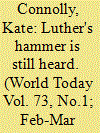

|
|
|
| 4 |
ID:
115233
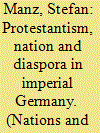

|
|
|
|
|
| Publication |
2012.
|
| Summary/Abstract |
This article examines the close connection between Protestantism and nationalism in Imperial Germany within a transnational context. In the years before 1914, the Prussian State Church in particular strengthened the legal and organisational framework for an increasing number of diaspora congregations to become attached. These acted as an important vehicle to embed the nationalist rhetoric produced within the Reich into emigrants' notions of belonging. Whilst previous scholarship has noted this connection in general, the article sheds more detailed light on the mechanics and structure, but also on the limits, of this process. Feedback processes from periphery to centre, in turn, had an impact on German national identity construction as that of a nation that was not confined to state borders. Applying a constructionist theoretical framework, the contested question of whether the heterogeneity of Germans abroad allows for the application of the diaspora concept is answered affirmatively.
|
|
|
|
|
|
|
|
|
|
|
|
|
|
|
|
| 5 |
ID:
137282
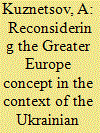

|
|
|
|
|
| Summary/Abstract |
THE UKRAINIAN STORM of 2013-2014 pushed the world dangerously close to Cold War II. The coup and the bloodshed which swept the country were caused by the refusal of the Yanukovich regime to draw closer to the EU no matter what rather than by the fairly acute social, economic and political disagreements inside the country.1 The consecutive packages of anti-Russian sanctions imposed by the European Union and coordinated, to a great extent, with the U.S. and several other non-European allies look very logical in the context of the stalled dialogue between the two key European players. It was in 2012-2013 that many of the expert community recognized an absence of a more or less noticeable progress in moving toward a visa-free regime between the EU and Russia and in settling other important bilateral issues for what it really was: the EU's unwillingness to develop equal partnership with Russia rather than technical discrepancies (according to Brussels). Its attention was riveted to the Eastern Partnership program designed, among other things, to detach CIS countries from Russia and draw new dividing lines in Europe. Is it correct to say that the anti-Russian rhetoric heard from Brussels and its active support of the radical Ukrainian nationalists who came to power in Kiev through an armed coup buried the Greater Europe idea? What is Greater Europe?
|
|
|
|
|
|
|
|
|
|
|
|
|
|
|
|
| 6 |
ID:
124641
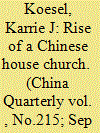

|
|
|
|
|
| Publication |
2013.
|
| Summary/Abstract |
This article investigates the similarities between the organizational innovation of one underground Protestant house church in China and the rise of early communist parties. Much like the spread of communism, the organizational tactics of the church are designed to protect it in a hostile political environment. The different levels are insulated from each other, with limited knowledge of the members above and below. In this way, if anyone is raided by the authorities, the others can continue to function with little interruption. Thus, the highly touted "organizational weapon" developed by the Bolsheviks and recycled, for example, by the Chinese Communist Party in their struggle for power, has resurfaced many years later. However, this time it has been adopted by a religious "vanguard."
|
|
|
|
|
|
|
|
|
|
|
|
|
|
|
|
| 7 |
ID:
080879
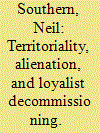

|
|
|
|
|
| Publication |
2008.
|
| Summary/Abstract |
During the Northern Ireland Troubles some Protestant communities suffered more than others. The loyalist Shankill area of West Belfast is one such place. Geographically situated between the republican strongholds of the Ardoyne and Falls, it was regularly exposed to violent attack. The area witnessed a series of republican bombings that included children in the death toll as well as many deadly shootings. Violence of this kind has left an indelible mark on the Shankill community. However, more than other loyalist areas, it was prepared to respond to republican violence with violence. But the community has not emerged from the Troubles with confidence. Unanticipated post-conflict factors of a political, cultural, and territorial nature are undermining efforts to promote community confidence and encourage paramilitary groups to decommission their weapons.
|
|
|
|
|
|
|
|
|
|
|
|
|
|
|
|
|
|
|
|
|